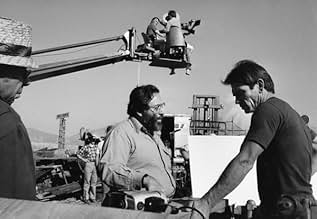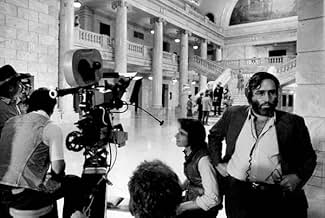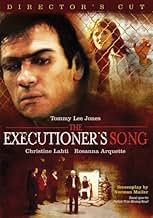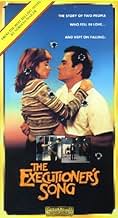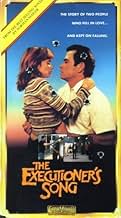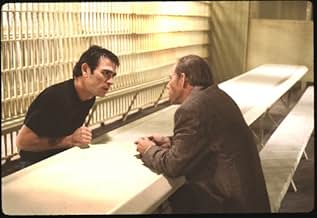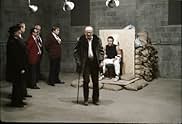La ballata della sedia elettrica
Titolo originale: The Executioner's Song
VALUTAZIONE IMDb
7,0/10
2136
LA TUA VALUTAZIONE
Aggiungi una trama nella tua linguaThe story of Gary Gilmore, a convicted murderer who lobbied for his own execution.The story of Gary Gilmore, a convicted murderer who lobbied for his own execution.The story of Gary Gilmore, a convicted murderer who lobbied for his own execution.
- Vincitore di 2 Primetime Emmy
- 2 vittorie e 3 candidature totali
Norris Mailer
- Lu-Ann
- (as Norris Church)
Trama
Lo sapevi?
- QuizAccording to Lawrence Schiller, Debra Winger was strongly favored for Nicole Baker, but was turned down after being considered "too urban" for the role. Tatum O'Neal also read for the role.
- BlooperWhen they are releasing the straps from Gilmore after he is dead you can see his hand move. In addition the arm is closer to the leg than depicted in the previous shot.
- Citazioni
Gary Mark Gilmore: Go down on me, partner... I need it
Nicole Baker: Don't call me partner.
Gary Mark Gilmore: No, darlin'... I love it... I love it
Nicole Baker: Yeah, you and seven other motherfuckers.
- Versioni alternativeA 97-minutes version was released theatrically in Europe, featuring additional footage with some nudity not shown in original television version.
- ConnessioniFeatured in The 35th Annual Primetime Emmy Awards (1983)
- Colonne sonoreTalk Good Boogie
Written and Performed by Waylon Jennings
Produced by Chips Moman
Music Coordinator: Marylou Hyatt
Recensione in evidenza
"The Executioner's Song" from 1982 was a TV movie, and on Netflix, I believe they send out the director's cut. It has lots of Roseanna Arquette's breasts and other body parts.
Based on the book by Norman Mailer (who also wrote the screenplay), this is the story of Gary Gilmore, who became famous by demanding that the state of Utah go ahead with his execution. It was the first execution in the US since the 1960s and the first since 1972 when the Supreme Court ruled that death sentences prior to that date were unconstitutional, which is why the Manson group was not executed.
Gilmore, who requested to face a firing squad, became kind of a cause celebre. As a hero of some sort, I suppose he fits in well with today's idea of a celebrity. He was basically a loser who always chose the easy way out. When he was released on parole for robbery, he had the help and support of his cousin (Christine Lahti) and his uncle (Eli Wallach), but he was unable to hold down a job and became obsessed with a 19-year-old (Arquette) with two children.
He then returned to the robbery business and for no good reason shot and killed two people after he robbed them.
I believe this was a TV movie in two parts, so what I saw was shortened. As a result, to make way for Arquette's body, there was quite a bit cut, making it jerky.
My main problem was getting any sympathy going for Gilmore or Arquette. Tommy Lee Jones did a terrific job, but even though Gary's family loved him and just hated the things he did, I as an audience member didn't share their feelings. As far as I'm concerned, he wanted to die because he didn't want to stay in prison. He robbed so he could pay for a truck and didn't have to work. Same old story - the easy way out.
This story was described as "tragic." The tragedy is that the Arquette character had two children. She was a whack job who tried to commit suicide so that she and Gary could continue their affair in heaven. It said at the end of the movie that she moved and started over. I hope for the sake of her kids that she made it. I have no doubt with her figure she met somebody. Let's hope it wasn't another loser.
Based on the book by Norman Mailer (who also wrote the screenplay), this is the story of Gary Gilmore, who became famous by demanding that the state of Utah go ahead with his execution. It was the first execution in the US since the 1960s and the first since 1972 when the Supreme Court ruled that death sentences prior to that date were unconstitutional, which is why the Manson group was not executed.
Gilmore, who requested to face a firing squad, became kind of a cause celebre. As a hero of some sort, I suppose he fits in well with today's idea of a celebrity. He was basically a loser who always chose the easy way out. When he was released on parole for robbery, he had the help and support of his cousin (Christine Lahti) and his uncle (Eli Wallach), but he was unable to hold down a job and became obsessed with a 19-year-old (Arquette) with two children.
He then returned to the robbery business and for no good reason shot and killed two people after he robbed them.
I believe this was a TV movie in two parts, so what I saw was shortened. As a result, to make way for Arquette's body, there was quite a bit cut, making it jerky.
My main problem was getting any sympathy going for Gilmore or Arquette. Tommy Lee Jones did a terrific job, but even though Gary's family loved him and just hated the things he did, I as an audience member didn't share their feelings. As far as I'm concerned, he wanted to die because he didn't want to stay in prison. He robbed so he could pay for a truck and didn't have to work. Same old story - the easy way out.
This story was described as "tragic." The tragedy is that the Arquette character had two children. She was a whack job who tried to commit suicide so that she and Gary could continue their affair in heaven. It said at the end of the movie that she moved and started over. I hope for the sake of her kids that she made it. I have no doubt with her figure she met somebody. Let's hope it wasn't another loser.
I più visti
Accedi per valutare e creare un elenco di titoli salvati per ottenere consigli personalizzati
Dettagli
Contribuisci a questa pagina
Suggerisci una modifica o aggiungi i contenuti mancanti

Divario superiore
By what name was La ballata della sedia elettrica (1982) officially released in Canada in English?
Rispondi


